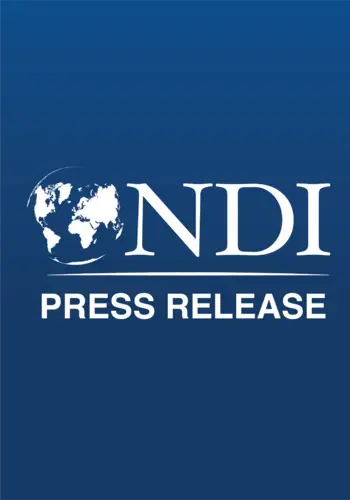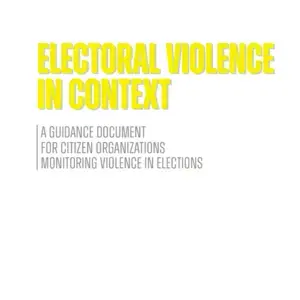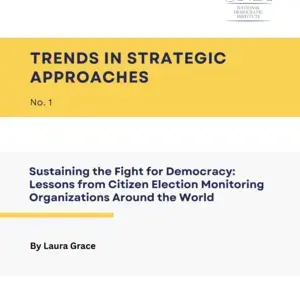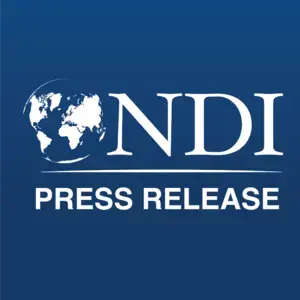Harare, Zimbabwe – The International Republican Institute (IRI) and the National Democratic Institute (NDI) fielded a three-person delegation to Zimbabwe to provide an impartial assessment of the status of Zimbabwe’s electoral reform agenda at approximately one year following the country’s 2018 “harmonized” elections.
At the invitation of the Government of Zimbabwe, the IRI/NDI jointly formed the Zimbabwe International Election Observation Mission (ZIEOM) in 2018. In the spirit of international cooperation and with respect to the laws and sovereignty of Zimbabwe, the mission observed the presidential, parliamentary, and local government elections over a seven-month period. The mission analyzed the pre-election period, voting and counting on Election Day, the announcement of results, the resolution of electoral disputes and the taking of office by the winners.
On October 27, 2018, the mission published a comprehensive report outlining its observation findings and offered recommendations to improve future electoral processes based on IRI/NDI’s comparative experience in international electoral observation. The report concluded that, while the 2018 elections presented the country with an historic opportunity to break with the past 18 years of political crises and mark the beginning of genuine democratic transition, due to an accumulation of missed opportunities and flaws in the process—including the August 1 violent crackdown on unarmed civilians and other acts of repression directed against opposition leaders—the improvements, while notable, were insufficient to establish broad confidence in the process.
Twelve months following the 2018 elections, IRI/NDI fielded a three-person delegation to Harare, from July 22 to 26, to assess the status of Zimbabwe’s electoral reform agenda and the space for democratic elections more broadly. Through this delegation, IRI/NDI seek to demonstrate the international community’s continued interest in and support for credible, peaceful elections; provide an accurate and impartial assessment on the reform process to date; and offer timely suggestions to improve future electoral processes. The delegation was led by former Ambassador to Zimbabwe and U.S. Assistant Secretary of State for African Affairs, Ambassador Johnnie Carson; Regional Director for East and Southern Africa for NDI, Dickson Omondi; and Senior Technical Specialist for East and Southern Africa for IRI, Jessica Keegan. The delegation is grateful for the cooperation it received from all Zimbabweans with whom it interacted, including the Minister of Justice, Legal and Parliamentary Affairs, the Speaker of the National Assembly, political party leaders, government officials and leaders from civil society.
The delegation met with a variety of stakeholders to monitor and benchmark progress achieved since the 2018 electoral cycle. The assessment was guided by the Declaration of Principles for International Election Observation as well as regional and international standards for democracy, elections and good governance.
Notable efforts are now underway to address the longstanding deficiencies in Zimbabwe’s electoral framework, which merit further support and encouragement. At the same time, public trust in the country’s electoral institutions remains low due to the failure to address the political context within which elections are conducted and to open up democratic space. Reform must go beyond amending laws to changing behaviors and creating an environment whereby all citizens can equally participate in public life and elections. There is still the opportunity for meaningful reform. Zimbabweans can build on the nascent efforts of the past 12 months and expand them to include genuine changes in behavior and an improved political environment necessary for democratic space and credible elections.
Summary of Assessment
Legal Framework
The delegation acknowledges that the Ministry of Justice, Legal and Parliamentary Affairs as well as the Speaker of the National Assembly, the Zimbabwe Election Commission (ZEC), and the Ministry of Information and Broadcasting Services have taken steps to enact a comprehensive legislative reform agenda. The delegation commends the relevant institutions, parliamentary committees, and ministerial bodies for initiating legal reforms immediately following the seating of parliament.
The establishment of the Inter-ministerial Task Force chaired by the Minister of Justice, Legal and Parliamentary Affairs and the creation of a Committee for Political and Electoral Reforms at the cabinet level are two of the most significant actions to date. In order to ensure broad political consensus both ruling and opposition parties should fully participate in the reform effort at all stages. Further, citizen input is an essential component of a healthy democracy and is critical for sound legislative development, and the delegation urges the executive committees responsible for driving and enacting the reform agenda to routinely seek and include participation of civil society.
The parliament, acting upon the recommendations from numerous election observation missions dating back to 2000, has introduced legislation to repeal and replace the Public Order and Security Act (POSA) and the Access to Information and Protection of Privacy Act (AIPPA). Portions of these two laws were not in line with fundamental rights and freedoms enshrined in the Constitution and the Government of Zimbabwe has taken positive steps to repeal and replace the two restrictive laws.
The successor to POSA, the Maintenance of Peace and Order Bill (MOPO), is currently before Parliament and the Justice Committee for debate. Likewise, the government has proposed replacing the AIPAA law with three new pieces of legislation: the Freedom of Information (FOI) Bill, the Data Protection Bill, and the Zimbabwe Media Commission Bill. The FOI has been gazetted and public hearings are expected to take place. The government has also approved the Broadcasting Services Amendment Bill, aimed at balancing Zimbabwe’s government-dominated media environment.
The delegation is pleased that its recommendation to amend and align Zimbabwe’s legal framework with the 2013 Constitution is being addressed and the delegation is optimistic that with continued focus and collective input from all stakeholders the laws that form Zimbabwe’s electoral and democratic framework can be improved. However, the delegation has heard concerns that the legislative details outlined in a number of the draft bills fall short of alignment. Insufficient consultation with CSOs about the substance of the bills and opacity in the legislative process raise concerns that the legislation will do little more than its predecessor to protect fundamental freedoms enshrined in the Constitution.
The delegation urges parliament to ensure a genuinely consultative process and that the proposed new laws provide the broadest protection of fundamental rights in the Constitution. The delegation is also encouraged that the Speaker of the National Assembly has announced that electoral reforms would be prioritized. Although no bill has been brought forth yet, we urge parliament to move as expeditiously as possible to bring forward a comprehensive piece of legislation that enjoys broad support of the main political parties and the public.
Media Environment
Advancements to promote a more balanced and fair media environment in Zimbabwe including the recently gazetted FOI bill contain progressive provisions for the disclosure of information and designation of information officers. However, the delegation has heard that the Bill may not provide easy and affordable access to public information.
It is also noted that there has been no action on the part of the Broadcasting Association of Zimbabwe (BAZ) to issue community radio station licenses. Since the enactment of the Broadcasting Services Act of 2001, not a single community radio station has been granted an operating license. Community radio stations provide an essential opportunity to transmit important information that citizens might not otherwise receive. The delegation urges enacting measures that foster a diverse media environment and that ensure equitable access to operating licenses.
Transparency and Public Engagement
A number of meetings and dialogues focused on reforms have taken place at the executive and parliamentary level. In December 2018, the National Assembly accepted and discussed a petition submitted by the Zimbabwe Elections Support Network (ZESN). ZESN also presented its recommendations to parliament in February which was then followed by ZEC hosting a multi-stakeholder conference. Both events signaled the beginnings of an inclusive reform process. The ZEC published its elections report, marking an effort to be transparent with the public about its successes and shortcomings. However, ZEC needs to do more to publicize its current and future plans to build greater public confidence in electoral institutions. The delegation expresses deep concern over the continued inadequacies in ZEC’s communication and public outreach efforts and recommends that the ZEC urgently adopt and implement an open and proactive communications strategy.
Leveling the Playing Field
Despite provisions in the Constitution explicitly forbidding traditional leaders from engaging in political affairs, unlawful involvement of traditional leaders persists. The conduct of some traditional leaders in by-elections, their perceived alignment with the incumbent political party, and impunity from the law, created an uneven playing field in the 2018 harmonized elections and the delegation continues to hear concerns regarding their undue influence on ordinary citizens.
As in the past, the delegation also continue to hear widespread reports of the distribution of government resources on a political basis. The delegation strongly recommends that effective mechanisms are introduced to ensure government resources do not serve partisan interests and that the constitutional provision prohibiting traditional leaders from engaging in partisan activities is enforced.
Party Conduct
A desire by the different parties for dialogue to address the current social, political and economic shortcomings has been noted. The delegation encourages all political actors to rise above partisan interests and put the people of Zimbabwe first in order for the country to more effectively address its serious and ongoing economic problems.
The delegation received reports that the seven local government by-elections that have taken place since the 2018 harmonized elections were conducted in a peaceful and orderly manner. However, there were still concerns raised about vote buying and intimidation. The politicization of food aid, medical supplies and agricultural inputs continue to weaken electoral integrity.
Security Influence
The delegation heard multiple concerns about the role of the military in putting down public demonstrations and its expanding influence in government operations. Citizen groups expressed deep concern about the violence that transpired on January 14 in which the security forces reportedly used excessive force to breakup demonstrations of the Zimbabwe Congress of Trade Unions. It is reported that at least 17 civilians were killed, more than a dozen women were raped or sexually assaulted and up to 1,055 people were detained. The violent and politically motivated attacks on civilians and the sustained intimidation of pro-democracy activists, opposition party leaders and their supporters based on their political beliefs contravenes protections within the constitution. We urge the government to respect and protect the rights of citizens to peacefully assemble and to carry out lawful political activities. Opposition protestors should also carry out their activities in accordance to the law.
Insufficient government investigation and adjudication for the perpetrators of violence has undermined public confidence in the government’s willingness to take action against those who engaged in political violence. Though the Motlanthe Commission of Inquiry was a positive step, the failure of the government to take any public or visible action toward the perpetrators of the August 1 shootings reinforces a culture of impunity and overshadows any progress that has been achieved. The delegation strongly recommends that the government take urgent action to ensure that effective complaints mechanisms are established to provide justice for victims of violence.
Conclusion
The delegation heard reports of low levels of trust in government institutions due to insufficient public outreach and systematic intimidation of opposition and civil society activists. Mismanagement of public funds and poor governance marked by inflation, currency instability, and shortages of fuel, food and medicines were also issues that were brought to the attention of the delegation. These serious issues overshadowed many of the positive actions taken by the government since the 2018 harmonized elections.
While notable efforts have been made to repeal and replace restrictive laws and to a lesser extent engage stakeholders, the delegation encourages the government of Zimbabwe, the ZEC and the Executive to address the fundamental deficit in the democratic space. The delegation strongly urges the government to continue to advance security and legal reforms that guarantee citizens’ constitutional right to freedom of expression, freedom of association and peaceful assembly. Enacting and enforcing these reforms will improve Zimbabwe’s democratic capital and help to advance the country’s economic recovery.
Despite the shortcomings identified by the delegation, there is still opportunity for Zimbabwe to enact the requisite meaningful political reforms to move the country forward. We urge the government to move swiftly to implement the political and electoral changes that will strengthen public confidence in the government and advance Zimbabwe’s democratic standing.
The delegation hopes that the assessment and recommendations presented in this statement contribute to constructive dialogue on Zimbabwe’s reform efforts and serve as a meaningful contribution to body of recommendations offered by other organizations including those of domestic observers, the Southern African Development Community (SADC), the African Union (AU) and others.
###




